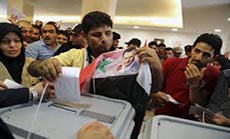
The Syrian Republic II: What will Al-Assad Change?

Sami Kleib - al-Akhbar newspaper
"Today, the course of the political solution to the crisis begins and so does that of the comprehensive reconciliation," said Syrian Foreign Minister, Walid Moallem, this old diplomatic who hasn't been known for speaking on the spur of the moment. He has undoubtedly thought of and mulled each and every word he had said while casting his vote in the ballot box. What he said was the headline of a conciliatory political stage that will soon start to come out to light.
After three years of warfare, destruction, and carnage, the next phase entails a comprehensive rescue plan. There are talks about already set architectural plans to reconstruct some cities and regions. It is being said that some contracts have been signed with important companies. Moreover, a bundle of laws on amnesty and gunmen integration in army and popular defense was drafted, in addition to reformist laws on services, employment, development, and economy.
But what about politics?
The current Syrian command relies on three key headlines:
1 - What was acceptable before the war and before watching the huge turnout to the ballot boxes in Syria and abroad was no longer now. Sacrifices are now very bog to save Syria.
2 - The political solution means the integration of all the communities and sects of the Syrian society in the next solutions yet under the ceiling of the current Constitution and state.
3 - All what can be developed is the form of the government whereas it can now include oppositionists "acceptable by the people." This means that there can't be sharing in power. Neither the Syrian Coalition has a share nor has any other oppositionist abroad.
The current Syrian command believes that what the already made reforms such as the amendment of the Constitution, the related referendum, the abrogation of article 8 of it and other were enough to convince everybody of throwing weapons and resort to dialogue. Notwithstanding, things got worse and there was more plotting. But now, after having changed the military equation, stood in the face of foreign intervention, and led the elections to success, the opposition abroad who has collaborated with "the enemies of the nation" is no more acceptable, unless it gives up foreign support and returns to the core of the state and works under the ceiling of the Constitution.
This is what a comprehensive reconciliation means. To enhance internal agreements is also meant. Every region where reconciliation is feasible and so is ceasing the war and people return is going to be a priority. It seems that this scene will be repeated over and over again. Internal sides participated in this, but also did external parties. For instance, it is familiar to see now some funder of the Daraa gunmen calling from UAE where he lives or from other western country looking for settlements.
It is also expected that during the upcoming stage, there will be attempts to break the sectarian equation that was fostered during the war. So, it would be no surprise to find names, that emerged during the war, appearing in the next configuration. This being said, those who have fought for three years and who are now contributing to the political solution are not the Alawites alone, but all the sects in Syria instead. For example, statistics show that Sunnites have turned out intensively to the ballot boxes.
Building on this, it seems that president al-Assad is well aware of how difficult the next stage is. The war has made wide rifts in the Syrian society; neighbors fought their neighbors, villages slaughtered towns surrounding them. Therefore, the coming time cannot be any ordinary as if happening in an ordinary state in an ordinary juncture. Everything is extraordinary and requires extraordinary solutions.
The first goal is to entrench people's trust in the army and the state. People are also asked to throw their weapons without fearing any punishment.
In the next strategy, there is a wish to say that the victory has trounced the conspiracy and its agents abroad and that those inside Syria were lured into the plot and that they should be treated as such. As to those who committed atrocities and belong to Takfiris, there is no way to talk to them but through military means. Hence, it is expected that reforms take place in tandem with reconciliations and political solutions and in conjuncture with the military operations on-the-ground.
The Syrian command sees that the acid test of the elections has succeeded more than it had expected. The command argues that the intensive turnout to the ballot boxes under fire and attacks was a crystal clear message to whoever wants to assimilate it. It seems that the polls have enrooted the command's conviction that the next stage, no matter how tough it would be, will be in its favor and to its advantage.
The first thing that al-Assad will certainly say in his first appearance after the elections is his confirmation that Syria has become, after the polls, has become in another place. Some even like to speak of the second Syrian republic.
The most important question remains: will the other axis leave Syria and its allies go ahead with the military option? Is it still able anyway to prevent them if it wants to? Or will the world accept the results of the polls even if it condemned them, and deal with the return of al-Assad to power for a third mandate? Fighting terrorism has become priority and not anything else.



